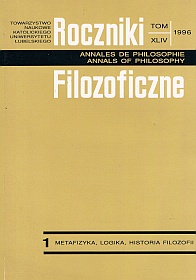Spór o stosowalność logiki formalnej do filozofii w szkole lubelskiej
Abstrakt
The first part of the paper discusses the basic theses of J. Łukaszewicz's theses stated in the 1920s, theses which concerned the relationship between philosophy and contemporary logic. Łukaszewicz's opinions a certain intellectual climate and projected on the programme of the Cracow Circle. The latter was formed in the 1930s by few people, well-oriented in traditional philosophy and trained in Polish logic, a logic leading in the world.
A further part of the paper emphasizes that the Philosophy Faculty, created at KUL in 1946, drew on to the works of the Cracow Circle. Thomism, in its existential variety, began to dominate at KUL. It was S. Swieżawski and M.A. Krąpiec who initiated this kind of Thomism. The philosophical milieu of KUL, the Lublin School of Philosophy were formed also by S. Kamiński, K. Wojtyła, J. Kalinowski, and M. Kurdziałek. The representatives of the Lublin School encountered the attempts made by the Cracow Circle to renew Thomist philosophy and make it scientific by means of the cognitive tools worked out by contemporary logic. Mainly the works written by Rev. J. Salamucha are under analysis here.
The last part of the paper includes the basic theses of the Lublin School concerning the applicability of formal logic to philosophy. There was no complete unanimity about that in the Lublin School. We may speak about a dispute within the Lublin School and a dispute between the Lublin School and the members of the Cracow Circle. It was stressed in the paper that, among other things, the Lublin School has convincingly shown that not every thesis in philosophy must be justified by means of formal proof. It has also been noticed that KUL has created a proper climate for the construction of non-classical logics in the form of the logic of non-extensional functors. And such constructions were in fact made.
Copyright (c) 1996 Roczniki Filozoficzne

Utwór dostępny jest na licencji Creative Commons Uznanie autorstwa – Użycie niekomercyjne – Bez utworów zależnych 4.0 Międzynarodowe.





